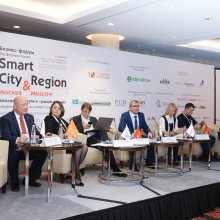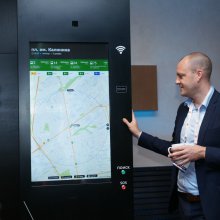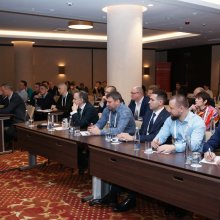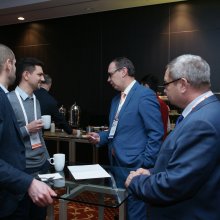About the event
Smart City is changing rapidly
On December 6, 2019 ComNews Group organized in the Moscow Marriott Novy Arbat Hotel the business forum entitled “Smart City & Region: Digital Technologies Paving Way To a Smart Country”, which concluded a series of eponymous regional events held in 7 cities of the country. The first forum kicked off in February 2019 in Saint Petersburg, and it was followed by events in Vladivostok, Sochi, Sevastopol, Ekaterinburg and Novosibirsk. Thus, the Moscow forum was on one hand dedicated to the Smart City topics relevant for Moscow, the Moscow region and Central Federal District (CFD), but on the other, it was meant to sum up the results of the entire year-long rally.
The forum in Moscow gathered about 140 high-profile members of legislative and executive government bodies from the CDF regions and cities, government institutions, federal telecommunication service providers, IT companies, vendors of ICT solutions, system integrators and developers of digital services. Overall, the 7 Smart City & Region events held throughout the year 2019 gathered about 900 persons.
The Strategic Partner of Smart City & Region in Moscow was PJSC MegaFon, while White Soft, Schneider Electric and LANIT Integration were Session Sponsors. The forum was also supported by Data East, and Gorserv Innovations was General Exponent.
The plenary session, dedicated to conceptual approaches and scaling of successful Smart City and Smart Region models towards a Smart Country was moderated by General Director and Editor-in-Chief of ComNews Group Leonid Konik. Peter Bjørn Larsen, Founder and Director of Smart City Insights ApS, who in 2015-2017 directed the Copenhagen City Data Exchange (a structure, which aimed to create the first digital city platform in the world in the capital of Denmark) presented an overview of global practices and typical mistakes the creators of Smart Cities tend to make. Besides, for the first time in the history of his public appearances, Peter Bjørn Larsen also spoke about the place and role of 5G networks for Smart City projects.
The Danish guest was followed by Co-founder and President of Smart Cities Andrey Belozerov, Deputy Head of IT Department of the Moscow City Administration in 2010-2017. His presentation was dedicated to the key problem in Russia – where to find funding for Smart City projects.
The practical vision was shared by Head of Chief Structural Engineers’ Board of the Consortium for Digital Economy and Chief Designer of ANCO ‘Digital Country’ Evgeniy Babayan, who spoke about the principles of building and expanding digital economy from a digital region to a smart city.
A spectacular example of Smart Region – digital transformation of public administration through the Regional Administration Center of the Moscow region Governor – was showcased by Advisor to the Minister of Public Administration and ICT of the Moscow region Anatoliy Kurmanov.
The plenary session was concluded by two state corporations, heavily engaged in Smart City projects – Rosatom and Rostelecom. Maxim Isaev, head of project office ‘Smart City and Digital Services’ at Rosatom Infrastructure Solutions, presented the concept of Lean Smart City. It was tested at Rosatom’s mono-cities (such as Sarov in Nizhni Novgorod region). Essentially, it is an extension of a corporate ERP system for public administration purposes. Today, Rosatom Infrastructure Solutions is promoting this concept not only in the cities, where it has big enterprises, but also in places where they have no presence.
Alena Vatbolskaya, from Rostelecom’s Digital Economy Projects Office, spoke about the company’s template solutions for Smart City and Smart Region, including city video surveillance, smart lighting system, regional platform for housing and public utilities, monitoring of housing properties and automation of major structural repairs’ fund. Vatbolskaya pointed out that implementation of Smart City increases the gaps between cities, located in the same region, and this is why Rostelecom, endorsed by the Federation Council, has initiated a new project – ‘Digital Region’. According to its authors, it is meant to expand upon the previous ministerial initiative of the Russian Ministry of Construction Industry, Housing and Utilities Sector – ‘Smart City’, and it will be supervised by the same Ministry of Construction, with the participation of Ministry of Communications.
Session 1, “Digital solutions serving a Smart City: Practical experience” was moderated by Vyacheslav Afanasyev, Expert on telecommunications from Centre du Commerce International (Geneva). The first speaker of the session was MegaFon’s Director for Digital Projects Development Ekaterina Nikishkina. Her presentation with a self-explanatory title – “Cities run by data” looked into such an essential element of Smart City as digital twin. Ekaterina Nikishkina emphasized that a city’s digital twin allows integrating all the areas of city life in one system. The first Digital City Twin platform, implemented by MegaFon in Saint Petersburg’s island district Kronshtadt, includes a comprehensive geo-analytics platform, software for city functions control, an interactive 3D model of the area, high-precision orthophotomaps, data aggregated from different sources, static and statistical layers of municipal facilities.
Subsequently, the audience was introduced to a number of diverse solutions for Smart City.
CEO of White Soft Andrey Dymchenko spoke about digital platform ‘Voice’ as the first step towards a Smart City. Founder of Gorserv Andrey Yatsenko presented such element of Smart City eco-system as a marketplace of consumer services, which provides work in the public utilities and housing sector for the self-employed citizens that offer consumer services. Schneider Electric’s Vice President for Marketing and Digital Experience Natalia Deyanova focused her presentation on the energy for Smart Cities, showcasing a number of projects implemented by her company – from the construction of one of the most highly automated and energy efficient sports venues in the world - T-Mobile Arena in Las Vegas (USA) to a reliable and high-performance infrastructure control system for the Zhigulevsk Valley technopark in Tolyatti (Volga Federal District). In conclusion, Natalia Deyanova spoke about Schneider Electric’s report for 2019 on the benefits of global digital transformation, which contains even more examples of projects implemented by this corporation.
Oleg Ena, Head of Project Office at the Federal Institute of Industrial Property (RosPatent), presented the findings of a unique study. Together with Dentons international law firm, the Institute has created the first Russian open patent landscape in Smart City. The partners discovered that Smart City technologies have been patented intensively in the last 3 years; today, there are about 33,000 technological solutions in this area in the world, and 4 out of every 5 of them are from China. “115 Smart City patent families are in use in Russia, with 4 out of 5 solutions being foreign technologies,” said Oleg Ena. “30 countries have market potential for such kind of solutions, and only 20 of them have their own inventions, which presents an opportunity for Russian developers, especially in the rapidly growing market of India.”
Georgiy Pchelintsev, Dentons’ Partner of IP, IT and Telecommunications Practice in Russia, shared with the audience the new tools for Smart City projects implementation and made an emphasis on the possibilities opened by the amendments to the laws “On Public-Private Partnership” and “On Concession Agreements” (224-FZ and 115-FZ), adopted on June 29, 2018. These amendments allow conclusion of public-private partnership and concession agreements around IT facilities without the need to erect any building or structure (as was required by previous versions of both laws).
Shvabe’s Deputy CEO for Sales, Marketing and Service Support of the Civil Market Ivan Ozhgikhin spoke about a smart transport system (STS) as a key component of Smart City. According to him, several federal programs envisage that by 2020, STS will expand nationwide and define KPIs for its implementation: ‘Safe City’ has a block on transport safety (supervised by the Emercom of Russia), “Enhancing road traffic safety” (Ministry of Interior) and “Transport System of Russia”, including the priority initiative “Safe and Quality Roads” (Ministry of Transport). “Today, available instruments do not allow regions to address the challenges of traffic control, while STS would be a comprehensive solution to their problems,” said Ivan Ozhgikhin. He added that Rostec Corporation’s radio-electronic cluster (including Shvabe) already has experience and competences in developing certain elements of the STS, including manufacturing, installation and maintenance of traffic signs and lights, video surveillance cameras and lamps, and also manufacturing of parking meters, pedestrian navigation systems and equipment for pre-trip medical examinations.
Session 2, entitled “Digital solutions serving a Smart City: practical experience” was moderated by correspondent of ComNews.ru Yulia Melnikova. The session was kicked off by CTO of Rossibinvest Alexander Shelepov (who spoke about the implementation of smart bus stops in different regions of Russia) and Data East’s chief expert on Geo-information systems Oleg Schwarz (who dedicated his report to a domestic cloud geo-information system for municipalities). The following discussion was joined by leading consultant from LANIT-Integration Andrey Mogilyov and Deloitte’s Manager of Sustainability team and Head of Blockchain Lab in the CIS Bulat Kaliev. They discussed such topical issues as the need for standards for Smart City projects, and what exactly should be standardized; ways to establish cross-regional cooperation towards a Smart Country; sources of full and comprehensive information on the best Smart City projects implemented; opportunities for telecommunication service providers to go beyond being a mere “pipeline”, which are opened with Smart City and Smart Region projects.
The business forum Smart City & Region: Digital Technologies Paving Way To a Smart Country 2019 concluded with an awards ceremony for leaders of the market “ComNews Awards. Digital Economy in a Smart City”.
Next year, ComNews Group will organize a federal forum Smart City & Region, which will take place on Feb. 20, 2020 in St. Petersburg. This event will explore new opportunities for regions, cities and municipalities to source federal financing for Smart City and Smart Region projects; reveal details of the new project ‘Digital Region’ and how it will be managed; shed light on the new standard on Smart City, developed by TC-194 to replace the eponymous document of the Ministry of Construction dated March 4, 2019; and also will assess and compare different industry ratings – from global lists and the ranking of innovative regions in Russia to ‘City IQ’ index and digital development indicators (as part of the National Index of Digital Economy in the Russian Federation).







